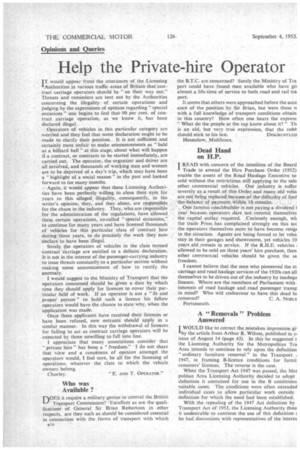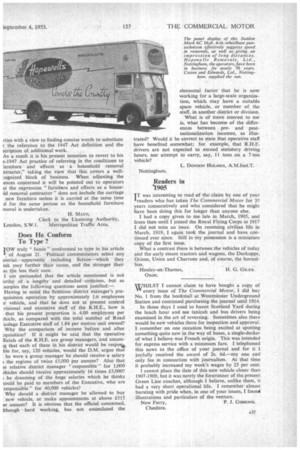Opinions and Queries
Page 50

Page 53

If you've noticed an error in this article please click here to report it so we can fix it.
Help the Private-hire Operator
IT would appear from the utterances of the Licensing 'Authorities in various traffic areas of Britain that 'contract carriage operators should be "on their way out." Threats and reminders are sent out by the Authorities concerning the illegality of certain operations and judging by the expressions of opinion regarding "special occasions" one begins to feel that90 per cent. of contract carriage operation, as we • know it, has been declared illegal.
.Operators of vehicles in this particular category are worried and they feel that some declaration ought to be made to clarify their position. It is not sufficient and certainly most unfair to make announcements as "bald as a billiard ball '• at this stage, about what will happen if a. contract, or contracts to be started immediately, are carried out. The operator, the organizer and driver are all involved, and thousands of working men and women are to be deprived of a day's trip, which may have been a "highlight of a social season" in the past and looked forward to for many months.
Again, it would appear that these Licensing .Authorities. have been perfectly willing to dose their eyes for years to this alleged. illegality, . consequently, in the writer's opinion, they, and theyalone, are respon.sible. for the chaos in the industry. They, who are.responsible' for the administration of the regulations, have allowed, these certain operations, so-called "special occasions," to continue for many years and have licensed thousands of vehicles for this particular class of'contract hire during these years, to do precisely the work they now: declare to have been illegal.
Surely the operators of vehicles in the class termed contract carriage are entitled to a definite declaration. It is not in the interest of the passenger-carrying industry to issue threats constantly to a particular section without making some announcement of how to rectify the anomaly. I would suggest to the Ministry of Transport that the operators concerned should be .given a date by which time they should apply for licences to cover their particular field of work. If an operator is not a "fit and proper' person" to hold such a licence his fellow operators would have the chance to state why, when the application was made. Once these applicants have received their licences or have been refused, new entrants should apply in a similar manner. In this way the withdrawal of licences for failing to act as contract carriage operators will be expected by those unwilling to fall into line. I appreciate that many associations consider that "private hire" has been a "freedom." I do not share that view and a concensus of opinion amongst the operators would, I feel sure, be all for the licensing of operations, whatever the class to which the vehicle owners belong.
Chorley. "E. AND T. OPERATOR."
Who was Available ?
DOES it require a military genius to control the British Transport Commission? Excellent as are the qualifications of General Sir Brian Robertson in other respects, are they such as should be considered essential in connection with the forms of transport with which
al6
the B.T.C. are concerned? Surely the Ministry of Tra port could have found men available who have gi almost a life-time of service to both road and rail tra port.
It seems that others were approached before the acce ance of the position by Sir Brian, but were these is with a full knowledge of transport conditions obtain in this country? How often one hears the express: What do the. people at the top know about it?" Tb is an old, but very true expression, that the cobt
should stick to his last. DISGRUNTLED Hounslow, Middlesex.
Dead Hand on H.P.
I READ with concern of the intention of the Board
Trade to amend the Hire Purchase Order (1952) enable the assets of the Road Haulage Executive to sold without the restrictions stiff applying to the sale other commercial vehicles. . Our industry is suffer severely as a. result of this Order.apd many old vehit are not being. replaced because..of the difficulty of find the balanceof payment wi thin 18 :months. • One famous c.oachbuilder is not paying •a-dividend t year because. operators dare. notcommit themselves the capital :outlay required. Curiously enough, wh the trade Press has complained strongly on this sec the operators themselves seem to have become resigt to the situation. Agents are being forced. to let vehic stay in their garages -and showrooms, yet vehicles 10 years old remain in service. If the R.H.E. vehicles ; allowed to be sold on three years' hire purchase, then other commercial vehicles should he given the sa
freedom. • •
I cannot believe that the men who pioneered the st; carriage and road haulage services of the 1920s can all themselves to be driven out of the industry by inadequ finance. Where are the members of Parliament with interests of road haulage and road passenger transp in mind? Who will endeavour to have this dead hs removed? C. A. NOBLE Portsmouth.
A " Removals " Problem Answered
I WOULD like to correct the mistaken impression gi' by the article from Arthur R. Wilson, published in yi issue of August 14 (page 43). In this he suggested t the Licensing Authority for the Metropolitan Tra Area intends to continue to rely upon the definition "ordinary furniture removal" in the Transport 1947, in framing B-licence conditions for furnit removers' licences. The reverse is the case, When the Transport Act 1947 was passed, the Met politan Area Licensing Authority decided to adopt definition it contained for use in the B conditions suitable cases. The conditions were often extended individual cases to allow particular work outside definition for which the need had been established.
With the repealing of the 1947 Act definition by Transport Act of 1953, the Licensing Authority thou it undesirable to continue the use of this definition. r. he had discussions with representatives of the interes rties with a view to finding concise words to substitute r the reference to the 1947 Act definition and the scription of additional work.
As a result it is his present intention to revert to his e-1947 Act practice of referring in the conditions to 'urniture and effects as a household removal ntractor," taking the view that this covers a wellognized block of business. When adjusting the ences concerned it will be pointed •out to operators at the expression "furniture and effects as a house'Id removal contractor" does not include the carriage new furniture unless it is carried at the same time .d for the same person as the household furniture moval is undertaken.
H. MAYO, Clerk to the Licensing Authority, LondOn, S.W.1. . Metropolitan Traffic Area.
Does He Conform To Type ?
IOW truly " Janus " conformed to type in his article
of August 21. Political commentators select any aterial—apparently including fiction—which they• ink may further their cause, and the stronger their as the less their care, I am persuaded that the article mentioned is not orthy of a lengthy and detailed criticism, but as .amples the following questions seem justified:— Having in mind the fictitious district manager's premuisition operation by approximately 1.6 employees !,r vehicle, and that he does not at present control visional and executive staff of. the R.H.E., how is that his present proportion is 4.00 employees per !hide, as compared with the total number of Road :aulage Executive 'staff of 1.84 per motive unit owned? Why the comparison of income before. and after quisition? If it might be said that the operative fficials of the R.H.E. are group managers, and assumtg that each of these in his district would be resporii ble for, say, 120 vehicles, would the D.M. argue that he were a group manager he should receive a salary
t the regions of twice £5,000 per annum? Also that le relative district manager " responsible " for 1,000
Dhicles should receive approximately 16 times £5,000? ; he dreaming of the huge salaries which he thinks iould be paid to members of the Executive, who are responsible" for 40,000 vehicles?
Why should a district manager be allowed to buy new vehicle, or make appointments at above £515 er annum? It is obvious that the official concerned, lthough hard working, has not assimilated the
elemental factor that he is now working for a large-scale organization, which may have a suitable spare vehicle, or member of the staff, in another district or division.
What is of more interest to me is, what has become of the differences between preand post nationalization incomes, as illustrated? Would it be correct to state that operative staff have benefited somewhat; for example, that R.H.E. drivers are not expected to exceed statutory driving hours, nor attempt to carry, say, 11 tons on a 7-ton vehicle?
L. DONSON HOLMES, A.M.Inst.T.
Nottingham.
Readers in 41905 IT was interesting to read of the claim by one of your 'readers who has taken The Commercial Motor for 35 years consecutively and who considered that he might have been doing this for longer than anyone else. I had a copy given to me late in March, 1905, and from then until I joined the Royal Flying Corps in 1917 I did not miss an issue. On resuming civilian life in March, 1919, I again took the journal and have continued ever since. Still in my possession is a miniature copy of the first issue.
What a contrast there is between the vehicles of today and the early steam tractors and wagons, the Durkopps, Oriens, Unics and Charrons and, of course, the horsedbus.
Henley-on-Thames, H. G. GILES. Oxon.
WHILST I cannot claim to have bought a copy of VT every issue of The Commercial Motor, I did buy No. 1 from the bookstall at Westminster Underground Station and continued purchasing the journal until 1914.
In thosedays I used to haunt Scotland Yard during the lunch hour and see taxicab and bus drivers being examined in the .art of reversing. Sometimes also there would be new vehicles there for inspection and approval. I remember on one occasion being excited at spotting something quite new in the way of buses, a single-decker of what I believe was French origin. This was intended for express service with a minimum fare. I telephoned this news to the office of your journal and for it I joyfully received the award of 2s. 6d.—my one and only fee in connection with journalism. At that time it probably increased my week's wages by 25 per cent. I cannot place the date of this new vehicle closer than 1907-1909, but it was surely the forerunner of the.present Green Line coaches, although I believe, unlike them, it had a very short operational life. I remember almost bursting with pride when, in one of your issues, I found illustrations and particulars of the venture.
New Ferry, P. J. GIBBONS. Cheshire.




















































































